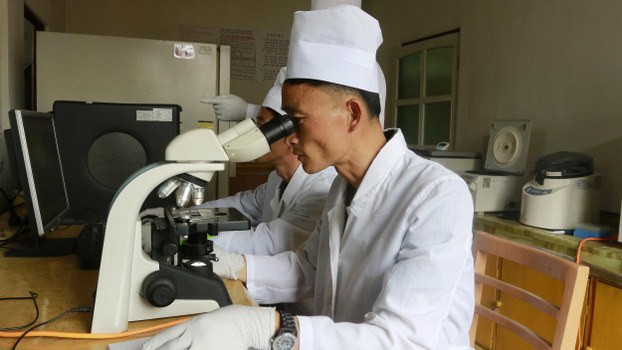




Officials in North Korea are blaming their government for ignoring requests from South Korea to cooperate to prevent the spread of African Swine Fever (ASF) on the Korean peninsula, local sources say.
After first being reported in China in August 2018, ASF spread all over that country, spilling over its borders into Vietnam and other neighboring countries.
According to statistics from the Food and Agriculture Organization of the United Nations, the Korean peninsula had been spared from the spread of the virus until May 2019, when North Korea reported an outbreak in Chagang province.
It was then that Seoul offered assistance to keep the virus contained, but Pyongyang never responded.
South Korea experienced its first and second ASF outbreaks last week at farms located within 10 kilometers (6 miles) of the demilitarized zone separating North from South.
Shortly after reports of the virus--deadly to pigs, but harmless to people--South Korea began nation-wide emergency containment measures, including restricting the movement of pigs and ordering several culls.
Seoul’s Ministry of Unification also sent a letter to Pyongyang last week urging that the two Koreas cooperate.
Pyongyang’s apparent reluctance to work with Seoul on the issue is maddening to North Korean officials. One trade official based in Dandong, China told RFA’s Korean Service last week that South Korea’s response appeared to have a sense of urgency that North Korea’s lacked.
“As soon as the swine fever broke out [in South Korea], the South Korean government declared a nationwide quarantine emergency and made all out efforts [to stop the spread.] I was surprised that it was so different from how we [handled it,]” said the official.
“In North Korea, the swine fever broke out in Sinuiju in early April,” the official said, offering an account that predates to the earlier mentioned UN figures on North Korea’s first reported outbreak.
“[The outbreak in Sinuiju] was reported to the Central Committee [of the Korean Workers’ Party] through the city’s quarantine office and the provincial quarantine service, but the Central Committee only ordered local quarantine offices to take measures against the disease. They did not come up with any actual quarantine measures,” the official said.
When those low-level measures failed and the disease spread to other areas, Pyongyang attempted to compensate.
“In May when [it] became more serious, the Central Committee banned the movement of pigs and the sale of pork, but by then it was too late,” the official said.
“Shortly after the swine fever was reported to the outside world [on May 23,] the South Korean government offered to help control the disease, but quarantine officials were very disappointed when they heard that North Korea did not accept the offer,” said the official.
The official said that it became known to quarantine officials that Seoul again offered to help control the disease following South Korea’s first outbreaks.
“[Quarantine officials] are expressing resentment, saying we definitely need the help from the South to completely fight off swine fever, but [the government] keeps rejecting the offer,” the official said.
Meat quotas still in place
A farming official from North Pyongan province’s Ryongchon county told RFA that the authorities are still pushing the farm industry to meet its quotas despite the disease.
“[The disease] is still spreading in the inland areas, including Sukchon county, South Pyongan province. But the Central Committee has not taken any measures and is forcing [farmers] in each region to work hard to produce meat and eggs,” the farming official said.
“The state-run farms and cooperative farm livestock teams are working hard to achieve [their quotas for] the meat production plan instead of taking preventative measures,” said the farm official.
The farm official blamed such rigid adherence to the state’s production plan as the main cause of ASF’s spread.
“This has the effect of only deepening the distrust of the party officials,” the farm official said, adding, “Officials are complaining about the authorities because they are refusing South Korea’s request to [help] control [the spread of] African swine fever.”
The farm official suggested that Kim Jong Un might be too proud to accept assistance from the south, but also said Kim “could lose face though damage done by swine fever.”
Reported by Hyemin Son for RFA’s Korean Service. Translated by Leejin Jun. Written in English by Eugene Whong.